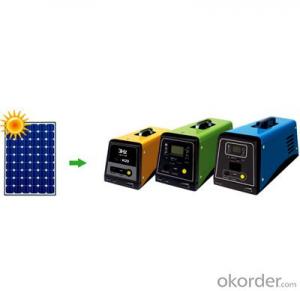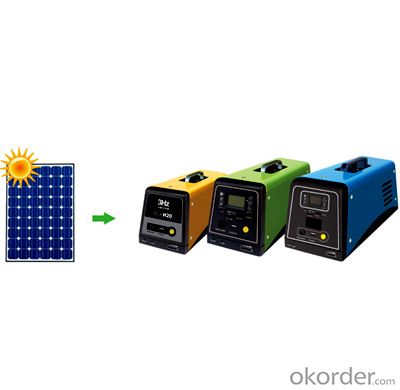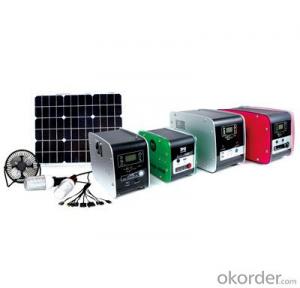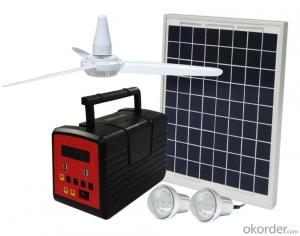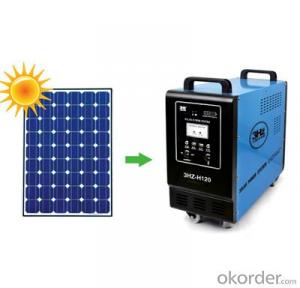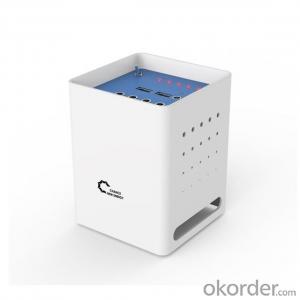Solar Energy Systems California:Portable Solar Generator with MP3/Solar Power System Free Shipping
- Loading Port:
- China Main Port
- Payment Terms:
- TT OR LC
- Min Order Qty:
- -
- Supply Capability:
- -
OKorder Service Pledge
OKorder Financial Service
You Might Also Like
Our new solar power system integrates stereo receiver, MP3 Player with audio speaker. Of course, its basic function is to generate electricity. The solar power system possesses LCD, volume controller, switch, LED indicator light and high-quality audio speaker, etc. It is humanized, energy saving and environmentally friendly. Also, the solar power system is easy to use.
3HZ-HP80W Solar Power System is specially designed for houses in rural area where grid electricity is unavailable. The system has advantages of automatic self-control and self-protect, best configuration, stable quality, noise-free, easy to install, easy to use, and long-lifetime.
Intelligent Charging Control - The system automates battery charging process in different modes, enhance charge, direct charge or float charge to extend battery lifetime.
Smart Power Supply - The inverter system automates voltage stabilizer, energy-saving compensation, and inverter functions. Multiple DC output options 5V and 12V. 5V DC power is suitable for cellphone charging, and 12V DC power can be used for small electrical appliances. One Direct 220V AC output which is suitable for lighting, television, electric fans and other household appliances.
Energy Saver - When the inverter system detects no AC output for 5 mins, it will shutdown DC - AC inverter feature to minimize internal power consumption.
Smart Soft-Start control - The inverter system is designed to accept high-resistance shock loads to ensure normal startup and power output capability.
parameters :
Operating temperature :-20~+70
Radio: FM 87.5-108MHz
Sound function: TF, MICRO SD, PLAY MP3
LIN-IN: MP3/ computer/CD/ mobile phone
Case Shell optional: Aluminum allay, organic material
Peak power:456W
Solar panel: 80W
Battery: 12V/38AH
Inverter: 220V/300W
Controller: 12V/5A
MINI Audio Radio with MP3
Output port: USB: 5V DC: 12V
Charging time Solar panel 4hours can be full charge.
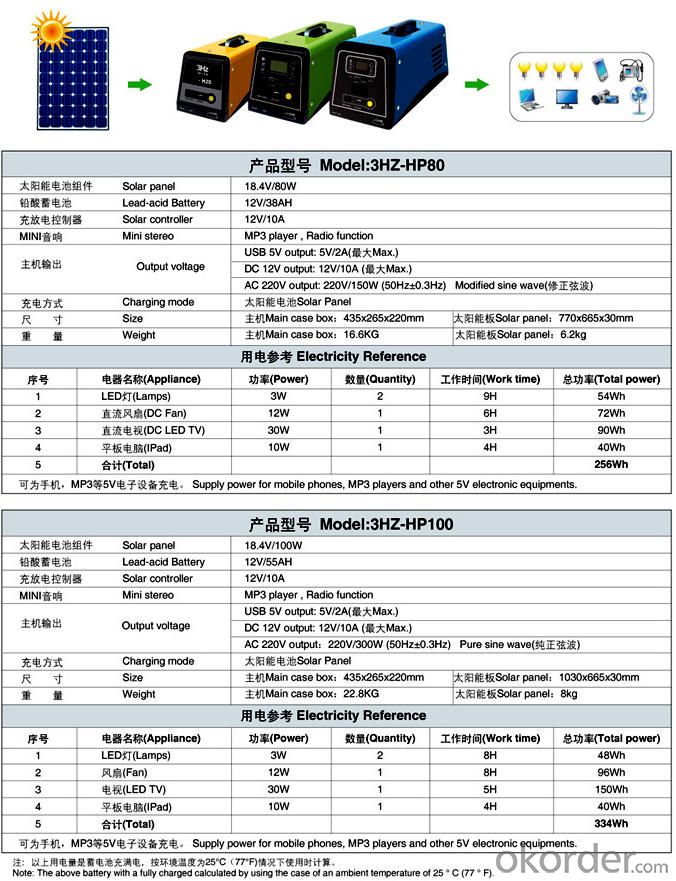
- Q: Can solar energy systems be used in areas with limited access to solar energy advocacy groups?
- Yes, solar energy systems can still be used in areas with limited access to solar energy advocacy groups. While advocacy groups can play a crucial role in promoting and supporting the adoption of solar energy, the installation and use of solar energy systems primarily depend on the availability of sunlight. As long as there is sufficient sunlight in an area, solar energy systems can be installed and utilized without the direct involvement of advocacy groups. In such cases, individuals or organizations can seek professional assistance from solar energy service providers, technicians, or manufacturers to install and maintain solar energy systems.
- Q: Are solar energy systems suitable for commercial buildings?
- Yes, solar energy systems are suitable for commercial buildings. They offer numerous benefits such as reduced energy costs, increased energy efficiency, and a positive environmental impact. Additionally, solar panels can be easily installed on rooftops or as ground-mounted systems, making them a viable option for various types of commercial buildings.
- Q: What is the maintenance schedule for a solar energy system?
- The maintenance schedule for a solar energy system typically involves regular inspections and cleanings to ensure optimal performance. Additionally, it is recommended to check the system's components, such as inverters, wiring, and batteries, for any signs of wear or malfunction. The frequency of maintenance depends on various factors, including the location, climate, and type of system. Generally, it is advised to have a professional inspection at least once a year, but regular self-monitoring and cleaning can help maintain the system's efficiency and longevity.
- Q: How does the age of a solar energy system affect its performance?
- The age of a solar energy system can significantly affect its performance. Over time, solar panels can experience a decrease in efficiency due to various factors. One of the main factors is the degradation of the photovoltaic cells themselves. The cells can deteriorate over time due to exposure to sunlight, extreme temperatures, and other environmental factors. This degradation can result in a decrease in the system's overall power output. Additionally, the components of the solar system, such as inverters and wiring, may also experience wear and tear over time. Inverters are responsible for converting the direct current (DC) generated by the solar panels into usable alternating current (AC) electricity. As they age, inverters can become less efficient or even fail, which can affect the system's performance. Another aspect affected by the age of a solar energy system is the technology itself. Solar technology is constantly evolving, and newer systems tend to be more efficient and produce higher power outputs compared to older systems. Therefore, older solar energy systems may not be able to match the performance of newer, more advanced systems. Regular maintenance and inspections can help mitigate some of the performance issues related to the age of a solar energy system. Cleaning the panels to remove dirt and debris, checking for any loose connections, and ensuring that the system is properly aligned can all contribute to maintaining optimal performance. In conclusion, the age of a solar energy system can impact its performance due to the degradation of photovoltaic cells, wear and tear on components like inverters, and the advancements in solar technology. Regular maintenance and staying up to date with the latest advancements can help prolong the lifespan and optimize the performance of a solar energy system.
- Q: Can solar energy systems be used for powering electric vehicle research and development centers?
- Yes, solar energy systems can be used for powering electric vehicle research and development centers. Solar energy is a renewable and clean source of energy that can help reduce the carbon footprint of these centers. By installing solar panels on the rooftops or open spaces around the centers, the solar energy can be harnessed and converted into electricity to power various operations and activities. This will not only provide a sustainable energy source but also reduce the dependency on conventional electricity and fossil fuels. Additionally, using solar energy can also help in cost savings in the long run, as the initial investment in solar panels can be offset by the reduced electricity bills. Overall, solar energy systems are a viable and environmentally friendly option for powering electric vehicle research and development centers.
- Q: Are there any disadvantages of using solar energy?
- Yes, there are a few disadvantages of using solar energy. Firstly, the initial installation cost of solar panels can be quite expensive. Additionally, solar panels can take up a significant amount of space, especially when considering large-scale installations. Furthermore, solar energy generation is dependent on sunlight availability, meaning it may not be as reliable during cloudy days or at night. Finally, the production and disposal of solar panels can have environmental impacts, as they involve the use of certain chemicals and materials.
- Q: What is the difference between solar thermal and solar PV systems?
- Solar thermal systems use the sun's energy to heat water or air for various applications such as heating homes or generating steam for power generation, while solar PV systems convert sunlight directly into electricity using photovoltaic cells.
- Q: Can solar energy systems be used in areas with low sunlight?
- Yes, solar energy systems can still be used in areas with low sunlight. While solar panels are most effective in areas with abundant sunlight, advancements in solar technology have made it possible to generate electricity even in areas with lower sunlight levels. Additionally, solar energy systems can still provide a reliable source of energy in such areas by utilizing battery storage to store excess energy generated during periods of higher sunlight and using it during times of lower sunlight.
- Q: How do solar energy systems impact the transportation sector?
- Solar energy systems can have a significant impact on the transportation sector by reducing reliance on fossil fuels. Solar-powered electric vehicles (EVs) offer a sustainable and renewable alternative to traditional gasoline-powered cars, reducing greenhouse gas emissions and air pollution. Additionally, solar energy can be used to power charging stations for EVs, making them more accessible and convenient for users. This shift toward solar energy in transportation promotes a cleaner and more sustainable future.
- Q: Can solar energy systems be used in areas with limited access to skilled labor?
- Yes, solar energy systems can be used in areas with limited access to skilled labor. Solar energy systems are designed to be simple and easy to install, requiring minimal technical expertise. With proper training and guidance, individuals with limited skills can learn to install and maintain solar panels. Additionally, advancements in technology have made solar systems more user-friendly, reducing the need for specialized knowledge. This makes solar energy a viable option for areas with limited access to skilled labor, providing clean and sustainable energy solutions.
Send your message to us
Solar Energy Systems California:Portable Solar Generator with MP3/Solar Power System Free Shipping
- Loading Port:
- China Main Port
- Payment Terms:
- TT OR LC
- Min Order Qty:
- -
- Supply Capability:
- -
OKorder Service Pledge
OKorder Financial Service
Similar products
Hot products
Hot Searches
Related keywords
